February 3, 2024
Poll: U.S. military presence in Syria
Key takeaways
-
The majority of respondents were unaware U.S. troops are currently stationed in Syria.
-
The majority of respondents were unaware U.S. troops are currently under attack in Syria.
-
Opposition to maintaining a presence in Syria grows if U.S. troops there were to be killed.
-
The majority of respondents were concerned the presence of U.S. troops in Syria could escalate into a broader regional conflict.
Background
Defense Priorities commissioned a YouGov poll to learn more about Americans’ awareness and opinion of the U.S. troop presence in the Middle East, particularly Syria, as well as Israel’s ongoing war in Gaza. Polling took place January 8–15, 2024.
U.S. troops in Iraq and Syria have been attacked more than 150 times since the outbreak of the Israel-Hamas War. These attacks by Iranian-backed Shia militias risk drawing the U.S. into a broader conflict that spreads across the region.
It’s critical to avoid direct U.S. involvement in the Israel-Hamas war, and it’s critical to avoid letting Israel’s war spillover into a wider regional war. This makes it critical to remove U.S. forces—which long ago lost a justifying security rationale—from Syria and the Greater Middle East, where they serve no vital U.S. missions and are vulnerable to attack by Iran-backed Shia militia groups.
Many Americans are unaware the United States maintains a troop presence in Syria. They are equally unaware those troops are under constant attack by Iranian-backed militias.
The data conveyed general opposition to a U.S. troop presence in Syria grows as its cost in American lives increases. This highlights the limited public mandate for the U.S. troop presence in Syria.
Methodology
YouGov interviewed 1,209 respondents who were then matched down to a sample of 1,000 to produce the final dataset. The respondents were matched to a sampling frame on gender, age, race, and education.
The sampling frame is a politically representative “modeled frame” of U.S. adults, based upon the American Community Survey (ACS) public use microdata file, public voter file records, the 2020 Current Population Survey (CPS) Voting and Registration supplements, the 2020 National Election Pool (NEP) exit poll, and the 2020 CES surveys, including demographics and 2020 presidential vote.
The matched cases were weighted to the sampling frame using propensity scores. The matched cases and the frame were combined, and a logistic regression was estimated for inclusion in the frame. The propensity score function included age, gender, race/ethnicity, years of education, homeownership, and region. The propensity scores were grouped into deciles of the estimated propensity score in the frame and post-stratified according to these deciles.
The weights were then post-stratified on 2020 presidential vote choice, as well as a four-way stratification of gender, age (4-categories), race (4-categories), and education (4-categories) to produce the final weight.
Poll results
Fewer than 30% of respondents were aware of the U.S. troop presence in Syria
Question: To the best of your knowledge, in which of the following countries does the U.S. currently have troops stationed?
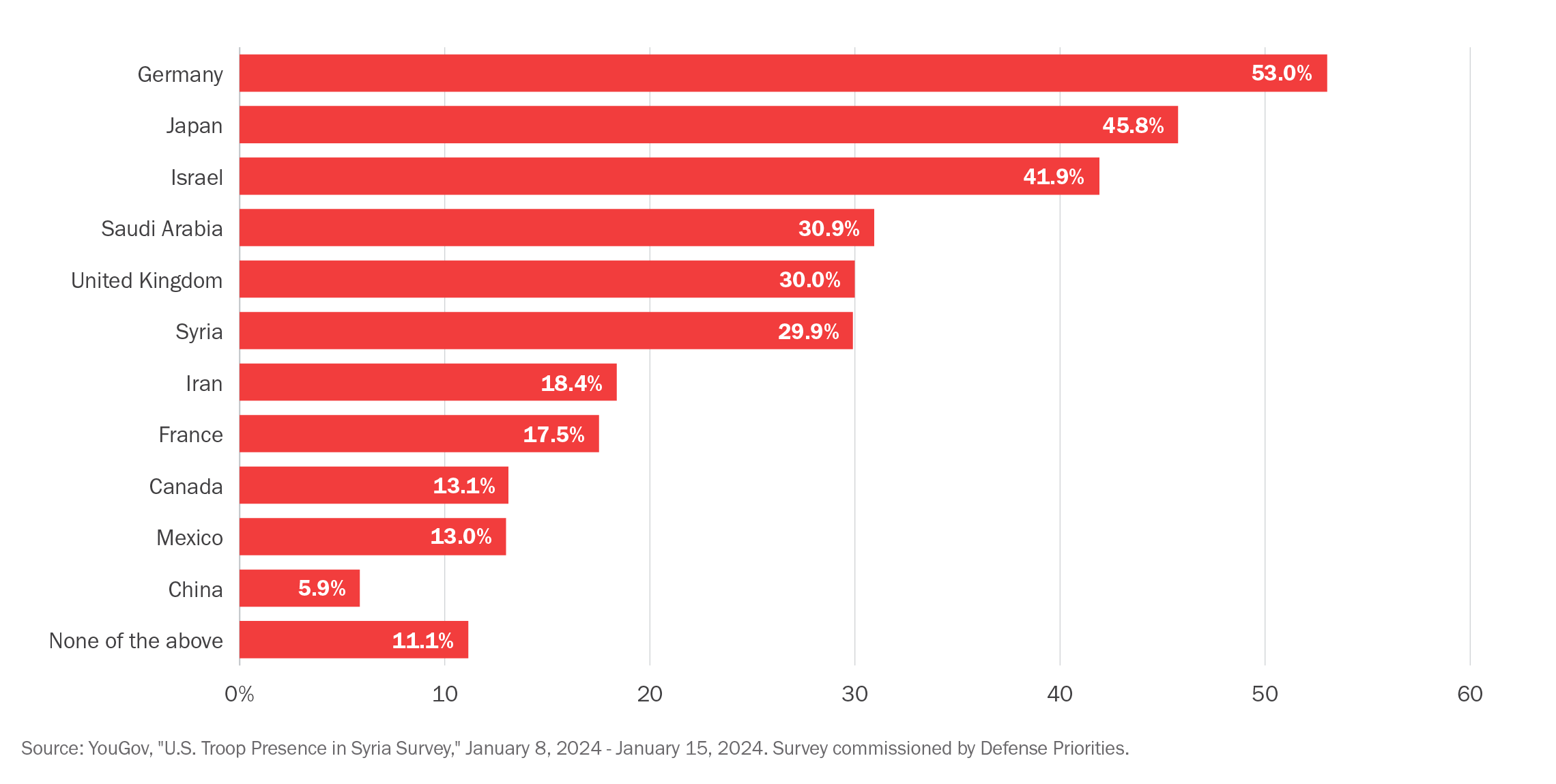
Fewer than one in four respondents were aware U.S. troops have been repeatedly attacked by Shia militia groups in the last month.
Question: To the best of your knowledge, in which of the following countries were U.S. troops attacked in the past month?
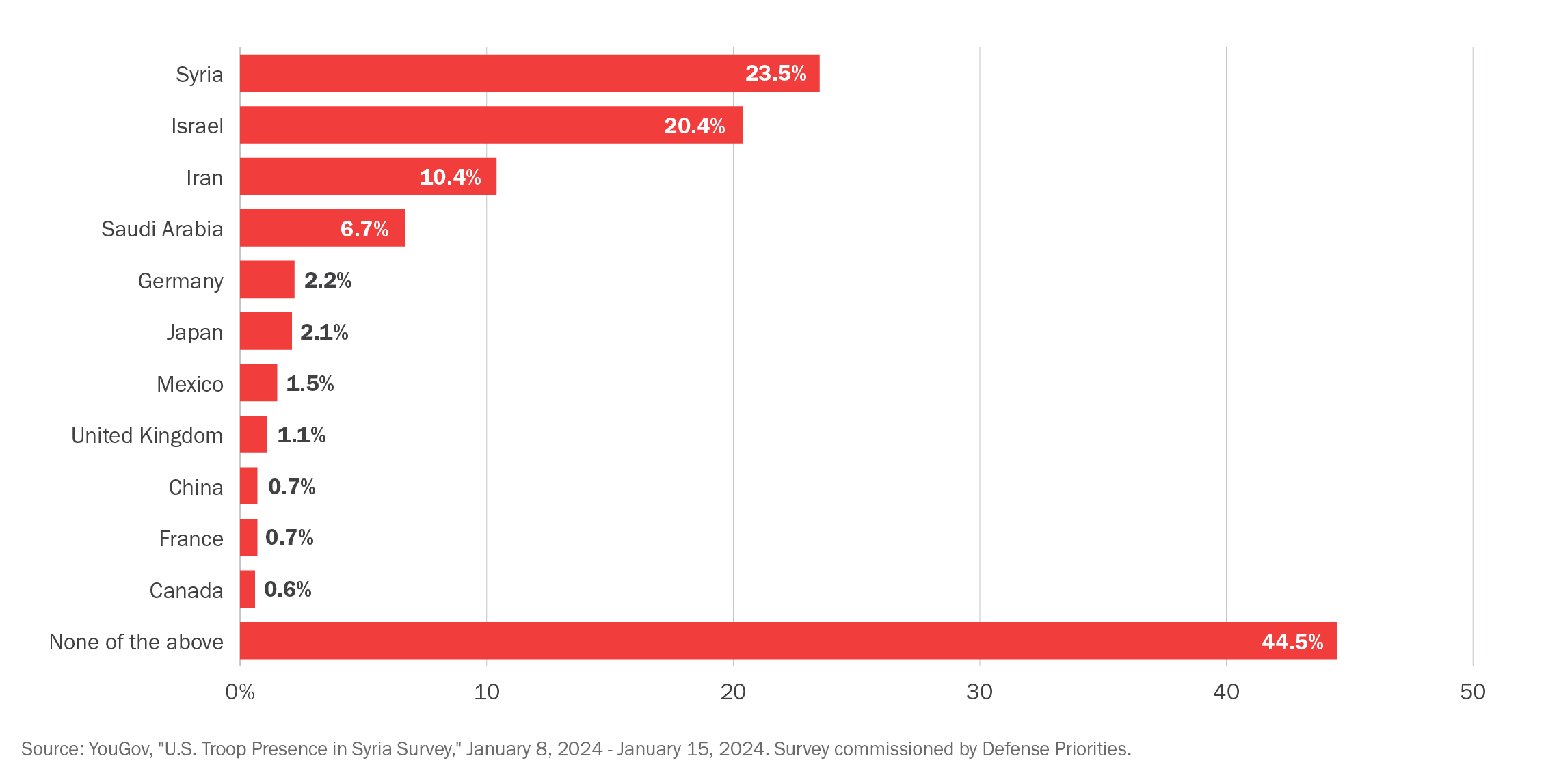
As the number of hypothetical U.S. servicemembers killed in Syria increases, opposition to sustaining the mission there grows.
Question: At present, no U.S. servicemembers have been killed during the mission in Syria. Imagine that U.S. servicemembers are killed in an attack while stationed in Syria. To what extent would you support the continued U.S. mission?
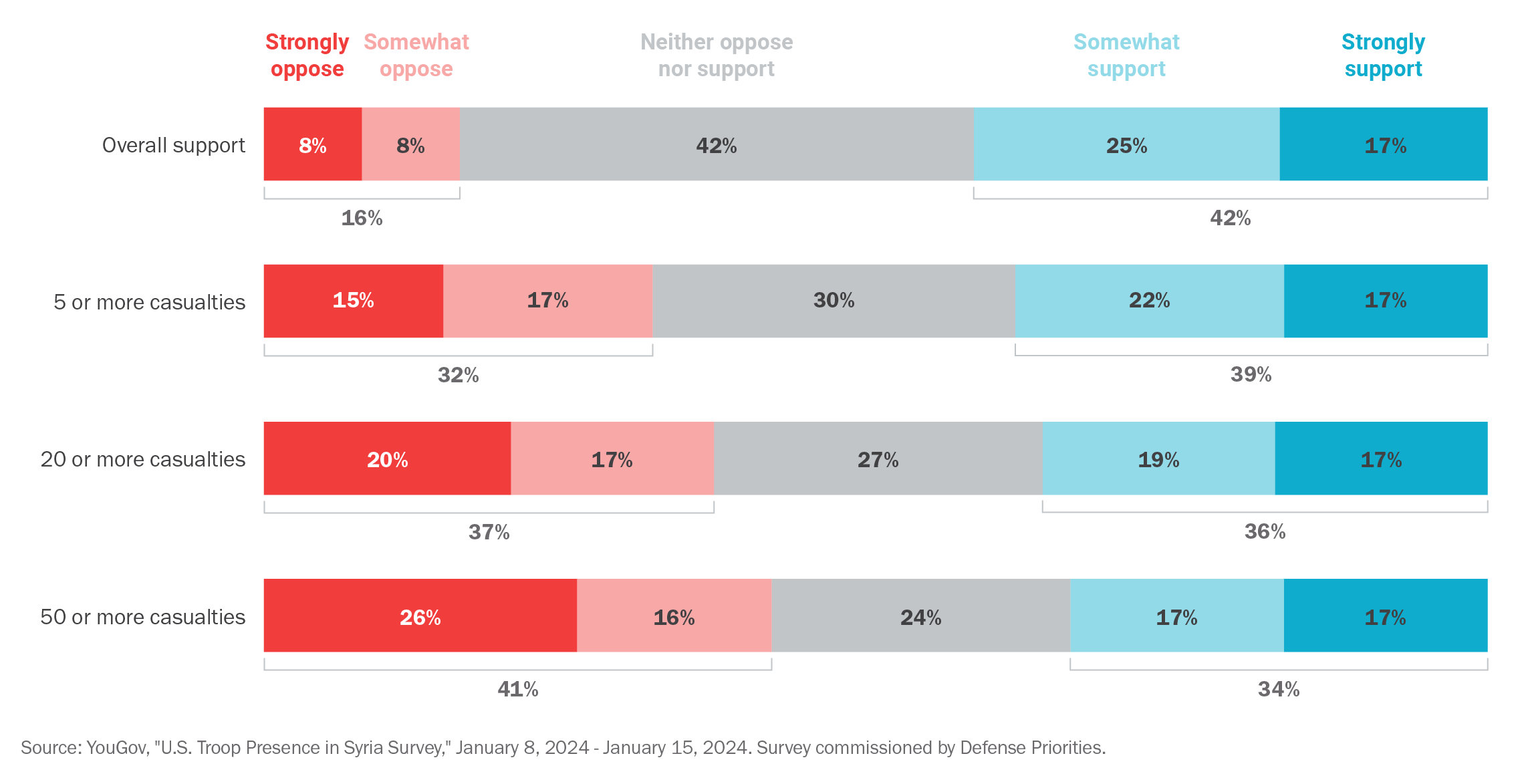
56% of respondents are “very worried” or “somewhat worried” the presence of U.S. troops in Syria could escalate into a broader conflict in the region.
Question: How concerned are you about the possibility that the presence of U.S. troops in Syria could escalate into a broader conflict in the region (e.g., with other regional powers such as Iran)?

A majority of respondents indicated Washington had other motives for maintaining a U.S. troop presence in Syria than the Biden administration’s stated reason (enduring defeat of ISIS and preventing Turkey from absorbing more Syrian territory).
Question: The United States currently has about 900 troops stationed in Syria. U.S. troops have been stationed there since 2015, as part of Operation Inherent Resolve, the military mission to degrade and destroy ISIS in Iraq and Syria. What do you think the official rationale is for U.S. troops remaining in Syria in 2023? Select all that apply.
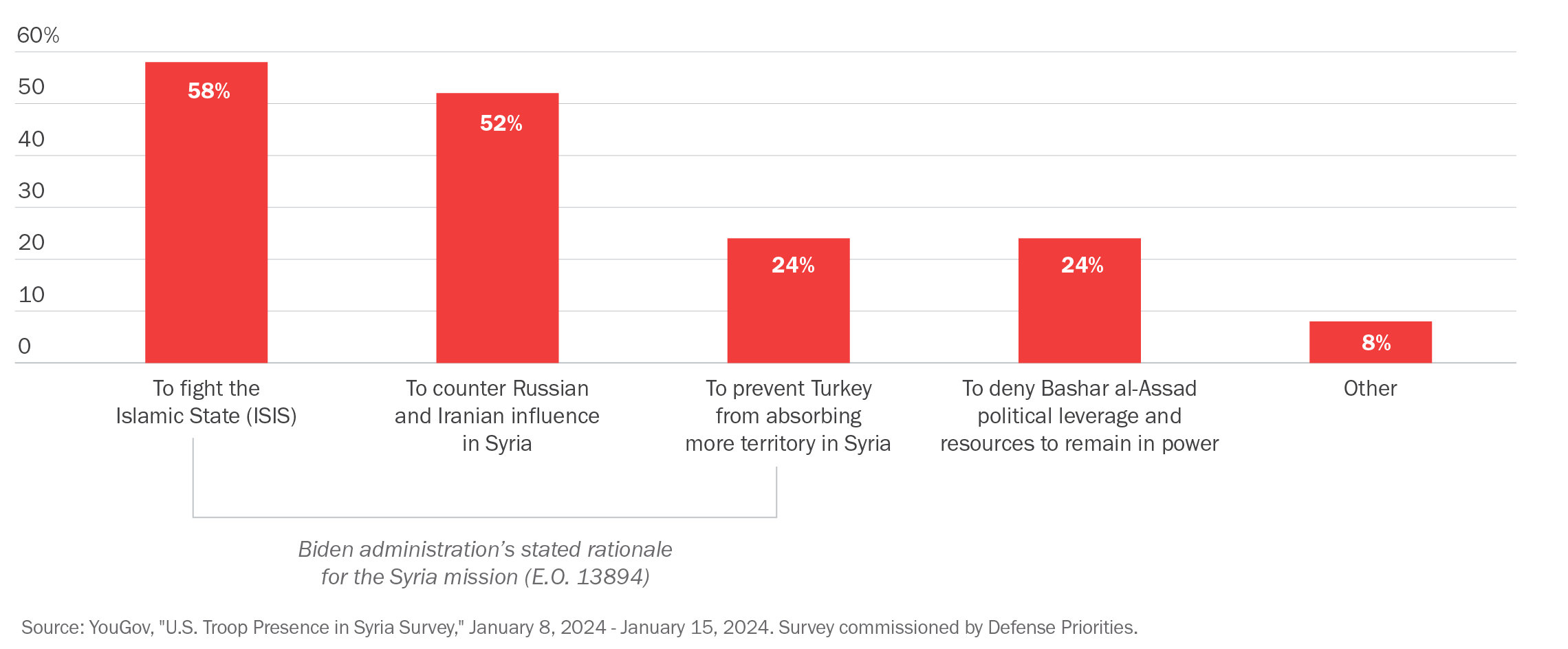
Among those who do not support the U.S. troop presence in Syria, nearly 66% indicated it was a waste of resources, and nearly 40% indicated it lacked legal justification and left U.S. troops vulnerable.
Question: You indicated you do not support the US mission in Syria. What are the reasons that you do not support a U.S. troop presence in Syria?
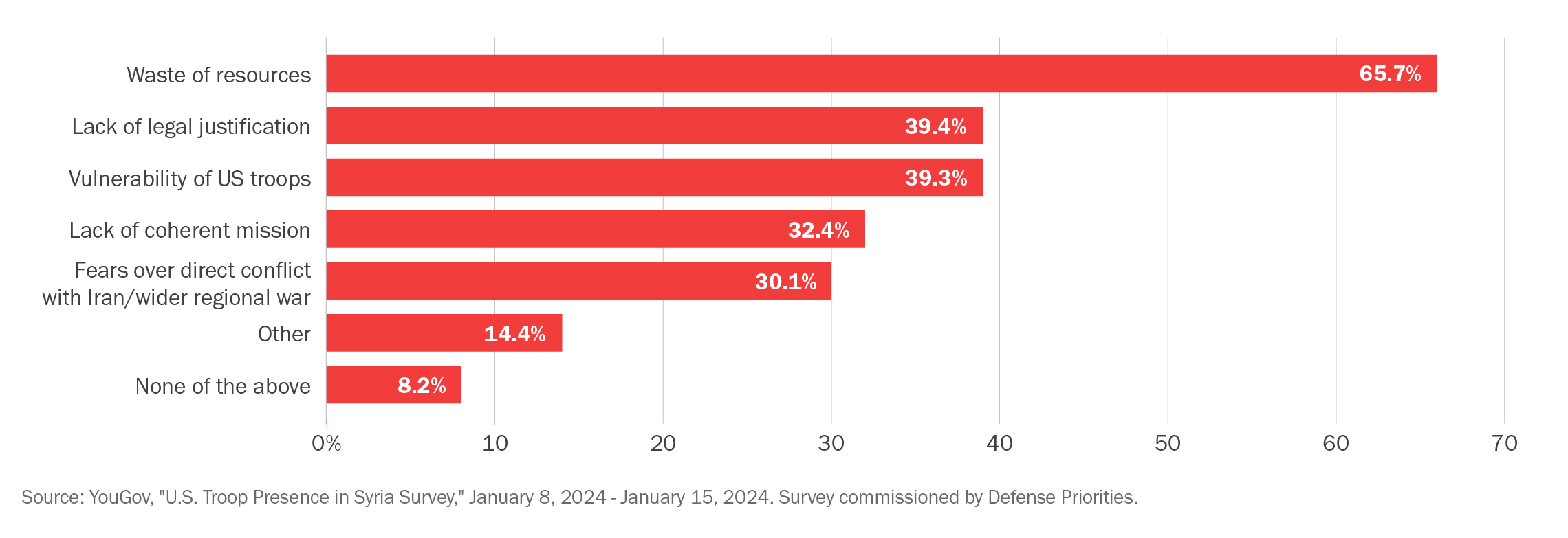
Only 10% of respondents believe Israel should conduct military operations in Gaza regardless of how many civilians are killed or injured.
Which of the following best describes your opinion on Israeli strikes on Hamas in the Gaza Strip? Please select the option that best matches your opinion, even if it is not a perfect match.

Additional analysis and experts
Find more research and analysis, or connect with experts.
More on Middle East

Featuring Jennifer Kavanagh
April 17, 2025
Events on Syria







